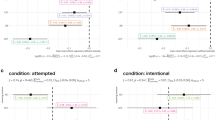Abstract
Theories of blame posit that observers consider causality, controllability, and foreseeability when assigning blame to actors. The present study examined which of these factors, either on their own or in interaction, predicted blame assigned to actors in a case of harm caused by negligence. The findings revealed that only causal impact ratings predicted blame. The findings also revealed a novel form of asymmetric discounting: the causal impact of a negligent actor was used to discount blame assigned to an innocent actor, but the causal impact of the innocent actor was not used to discount the blame assigned to the negligent actor.
Similar content being viewed by others
Notes
The race of each driver was varied such he was either described as being Black or White. Neither manipulation had an effect on blame and subsequent results collapse across them.
References
Alicke M (2000) Culpable control and the psychology of blame. Psychol Bull 126:556–574
Branscombe NR, Wohl MJA, Owen S, Allison JA, N’gbala A (2003) Counterfactual thinking, blame assignment, and well-being in rape victims. Basic Appl Soc Psych 25:265–273
Brewer MB (1977) An information processing approach to attribution of responsibility. J Exp Soc Psychol 13:58–69
D’Arcy E (1963) Human acts: an essay in their moral evaluation. Clarendon, Oxford
Davis CG, Lehman DR, Silver RC, Wortman CB, Ellard JH (1996) Self-blame following a traumatic event: the role of perceived avoidability. Pers Soc Psychol B 22:557–567
Fincham FD, Jaspars JM (1983) A subjective probability approach to responsibility attribution. BrJ Soc Psychol 22:145–162
Fincham FD, Schultz TR (1981) Intervening causation and the mitigation of responsibility for harm. Br J Soc Clin Psychol 20:113–120
Frankfurt HG (1988) The importance of what we care about: philosophical essays. Cambridge University Press, Cambridge
Goldinger SD, Kleider HM, Azuma T, Beike DR (2003) “Blaming the victim” under memory load. Psychol Sci 14:81–85
Hart HLA (1968) Punishment and responsibility. Clarendon, Oxford
Hart HLA, Honoré AM (1959) Causation in the law. Clarendon, Oxford
Heider F (1958) The psychology of interpersonal relations. Wiley, New York
Kahneman D, Tversky A (1982) The simulation heuristic. In: Kahneman D, Slovic P, Tversky A (eds) Judgment under uncertainty: Heuristics and biases. Cambridge University Press, New York, pp 201–208
Karlovac M, Darley JM (1989) Attribution of responsibility for accidents: a negligence law analogy. Soc Cogn 4:287–318
Kelley HH (1972) Attribution in social interaction. In: Jones EE, Kanouse DE, Kelley HH, Nisbett RE, Valins S, Weiner B (eds) Attribution: perceiving the causes of behavior. General Learning Press, Morristown, pp 1–26
Mackie JJ (1977) Ethics: inventing right and wrong. Penguin, New York
Mandel DR, Dhami MK (2005) “What I did” versus “What I might have done”: effect of factual and counterfactual thinking on blame, guilt, and shame in prisoners. J Exp Soc Psychol 41:637–645
Mandel DR, Lehman DR (1996) Counterfactual thinking and ascriptions of cause and preventability. J Pers Soc Psychol 71:450–463
Markman KD, Tetlock PE (2000) “I couldn’t have known”: accountability, foreseeability and counterfactual denials of responsibility. Br J Soc Psychol 39:313–325
Miller DT, Gunasegaram S (1990) Temporal order and the perceived mutability of events: implications for blame assignment. J Pers Soc Psychol 59:1111–1118
Mobbs D, Lau HC, Jones OD, Frith CD (2007) Law, responsibility, and the brain. PLoS Biol 5:693–700
Pizarro D, Uhlmann E, Salovey P (2003) Asymmetry in judgments of moral blame and praise: the role of perceived metadesires. Psychol Sci 14:267–272
Poulton EC (1994) Behavioral decision theory: a new approach. Cambridge University Press, New York
Prosser WL (1955) Handbook on the law of torts. West, St Paul
Schlenker BR, Britt TW, Pennington J, Murphy R, Doherty K (1994) The triangle model of responsibility. Psychol Rev 101:632–652
Shaver KG (1985) The attribution of blame: causality responsibility and blameworthiness. Springer, New York
Shaw ME (1968) Attribution of responsibility by adolescents in two cultures. Adolescence 3:23–32
Shultz TR, Schleifer M (1983) Towards a refinement of attribution concepts. In: Jaspars J, Fincham FD, Hewstone M (eds) Attribution theory and research: conceptual. developmental and social dimensions. Academic Press, London, pp 37–62
Shultz TR, Wright K (1985) Concepts of negligence and intention in the assignment of moral responsibility. Can J Beh Sci 17:97–108
Shultz TR, Wright K, Schleifer M (1986) Assignment of moral responsibility and punishment. Child Dev 57:177–184
Spellman BA (1997) Crediting causality. J Exp Psychol Gen 126:323–348
Spellman BA, Kincannon AP, Stose SJ (2005) The relation between counterfactual and causal reasoning. In: Mandel DR, Hilton DJ, Catellani P (eds) The psychology of counterfactual thinking. London, Routledge, pp 28–43
Tetlock PE, Visser PS, Singh R, Polifroni M, Scott A, Elson SB, Mazzocco P, Rescober P (2007) People as intuitive prosecutors: the impact of social–control goals on attributions of responsibility. J Exp Soc Psychol 43:195–209
Trabasso TR, Bartalone J (2003) Story understanding and counterfactual reasoning. J Exp Psychol Learn Mem Cogn 28:1154–1170
Woolfolk RL, Doris JM, Darley JM (2006) Identification, situational constraint, and social cognition: studies in the attribution of moral responsibility. Cognition 100:283–301
Author information
Authors and Affiliations
Corresponding author
Rights and permissions
About this article
Cite this article
Mandel, D.R. Predicting blame assignment in a case of negligent harm. Mind Soc 9, 5–17 (2010). https://doi.org/10.1007/s11299-009-0064-3
Received:
Accepted:
Published:
Issue Date:
DOI: https://doi.org/10.1007/s11299-009-0064-3




